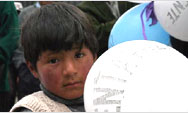Malaria in Complex Emergencies
There is a growing recognition that African
countries in states of war and conflict account for a rapidly
growing percentage of the total deaths due to malaria. In
Angola, Sudan and the Democratic Republic of Congo (DROC)
malaria is the most common cause of morbidity and mortality.
RBM has estimated that the total annual malaria mortality
that occurs in countries affected by complex emergencies
is over 30% of the world's annual total. USAID, through
WHO, is supporting a five-year effort to roll back malaria
in complex emergencies. Objectives of this program include:
- To assure core capacity within the RBM Secretariat for
coordination of field support activities
- To ensure timely implementation of priority emergency
activities (through partners) in acute phase emergencies
(two maximum)
- To expand priority RBM activities amongst the most vulnerable
war affected populations in DR Congo and Sudan
- To evaluate the effectiveness and tolerability of one-day
artemisinin-based combination therapy options
Components of this five-year effort include:
- Coordination of the RBM Secretariat complex emergencies
initiative.
- Ensuring timely implementation of priority emergency
activities (through partners) in acute phase emergencies
- Expansion of priority RBM activities amongst the most
vulnerable war affected populations in DR Congo and Sudan
- Field evaluation of one-day malaria drug therapy options
for potential use in acute phase emergencies
Collaborating Organizations: WHO, NGOs,
UN agencies, faith-based organizations, academic partners,
and local and national authorities.
|


